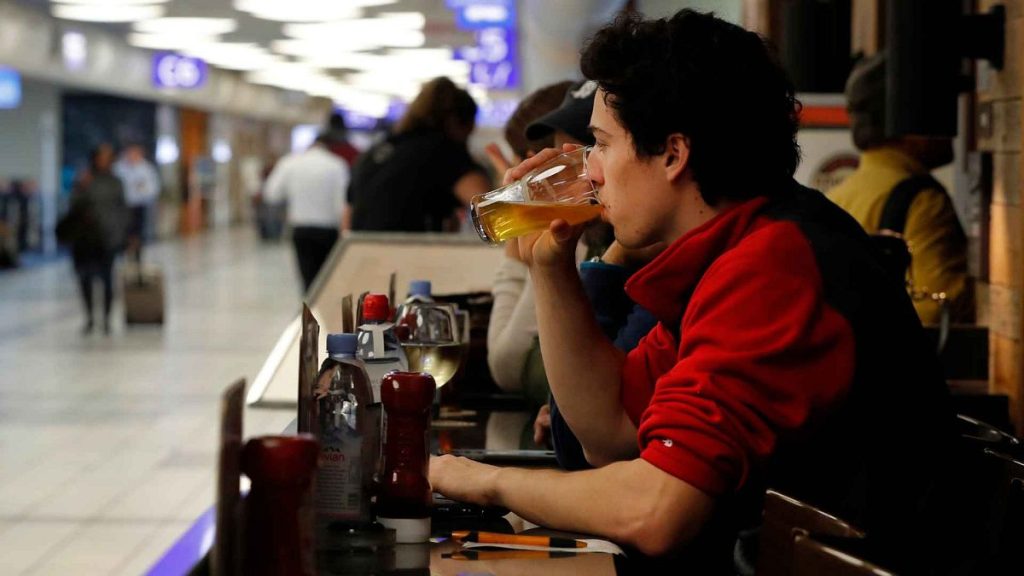Ryanair, the Irish budget airline, has issued a strong call for stricter regulations on alcohol consumption at airports, advocating for a two-drink limit per passenger prior to boarding. This initiative aims to curb the escalating problem of disruptive behavior on flights, an issue that has increasingly plagued the aviation industry. The airline’s demand stems from a recent incident where a passenger’s unruly conduct, attributed to excessive alcohol consumption, forced a flight diversion, resulting in substantial financial losses and inconvenience for both the airline and fellow passengers. Ryanair emphasizes the necessity of such measures to ensure the safety and well-being of all individuals on board, including passengers and crew.
The airline’s plea for intervention from EU authorities highlights the growing concern over alcohol-related disturbances on flights. Ryanair points out that while alcohol sales are restricted during flights, the absence of similar regulations at airports allows passengers, especially during flight delays, to consume excessive amounts of alcohol before boarding. This pre-flight indulgence often leads to disruptive behavior in the air, jeopardizing the safety and comfort of everyone involved. The airline argues that implementing a two-drink limit, enforced through boarding pass checks, would create a more controlled environment and significantly reduce the occurrence of such incidents, ultimately improving the overall travel experience.
Ryanair’s call for action is underscored by a recent incident where the airline incurred significant costs due to a passenger’s disruptive behavior. The incident, which involved a flight diversion, resulted in substantial expenses related to passenger accommodation, crew costs, airport fees, legal proceedings, and lost revenue. The detailed breakdown of these costs serves as a stark illustration of the financial ramifications of disruptive passenger behavior, further strengthening Ryanair’s argument for stricter alcohol control measures. This incident not only highlights the immediate financial burden on the airline but also underscores the broader disruption caused to fellow passengers and the overall operational efficiency of the airline.
The escalating problem of unruly passenger behavior is not unique to Ryanair or even Europe. Global aviation bodies like the International Air Transport Association (IATA) have reported a worldwide increase in such incidents. While the exact contribution of alcohol to these disturbances isn’t fully quantified, it’s widely acknowledged as a significant factor. Initiatives such as the “One Too Many” campaign in the UK underscore the aviation industry’s efforts to address alcohol-related issues and promote responsible alcohol service and consumption within the airport environment. These campaigns aim to educate passengers about the potential consequences of excessive alcohol consumption and encourage responsible behavior.
The aviation industry, including regulatory bodies and airlines, has been grappling with the challenge of unruly passenger behavior. While still statistically rare, the increase in both the number and severity of incidents has raised serious concerns. Various factors contribute to this rise, including increased passenger numbers, post-pandemic travel surges, and the stresses associated with air travel. However, alcohol consumption remains a prominent factor in many of these disruptive incidents, prompting calls for more effective control measures. The challenge lies in finding a balance between passenger freedom and ensuring a safe and comfortable environment for all.
Ryanair’s proposal for a two-drink limit at airports is a significant step towards addressing the issue of alcohol-fueled disruptive behavior on flights. It represents a proactive approach to mitigating risks and ensuring a more pleasant and secure travel experience for all passengers and crew. While the implementation of such a policy would require collaboration between airlines, airport authorities, and regulatory bodies, it offers a practical solution to a persistent problem. The success of such an initiative would rely on effective communication, consistent enforcement, and a shared understanding of the importance of passenger and crew safety and well-being.









